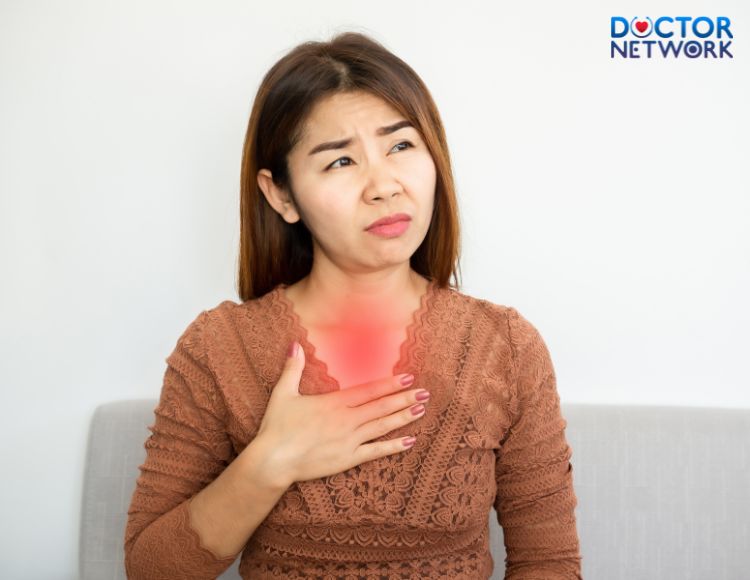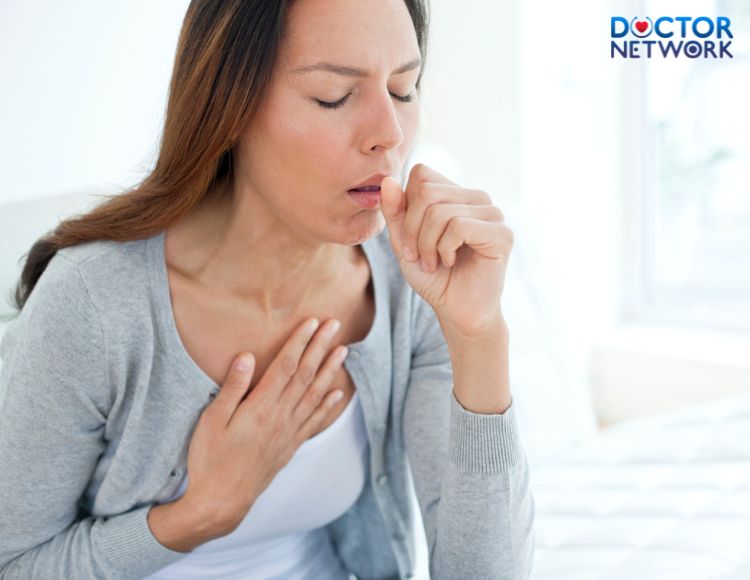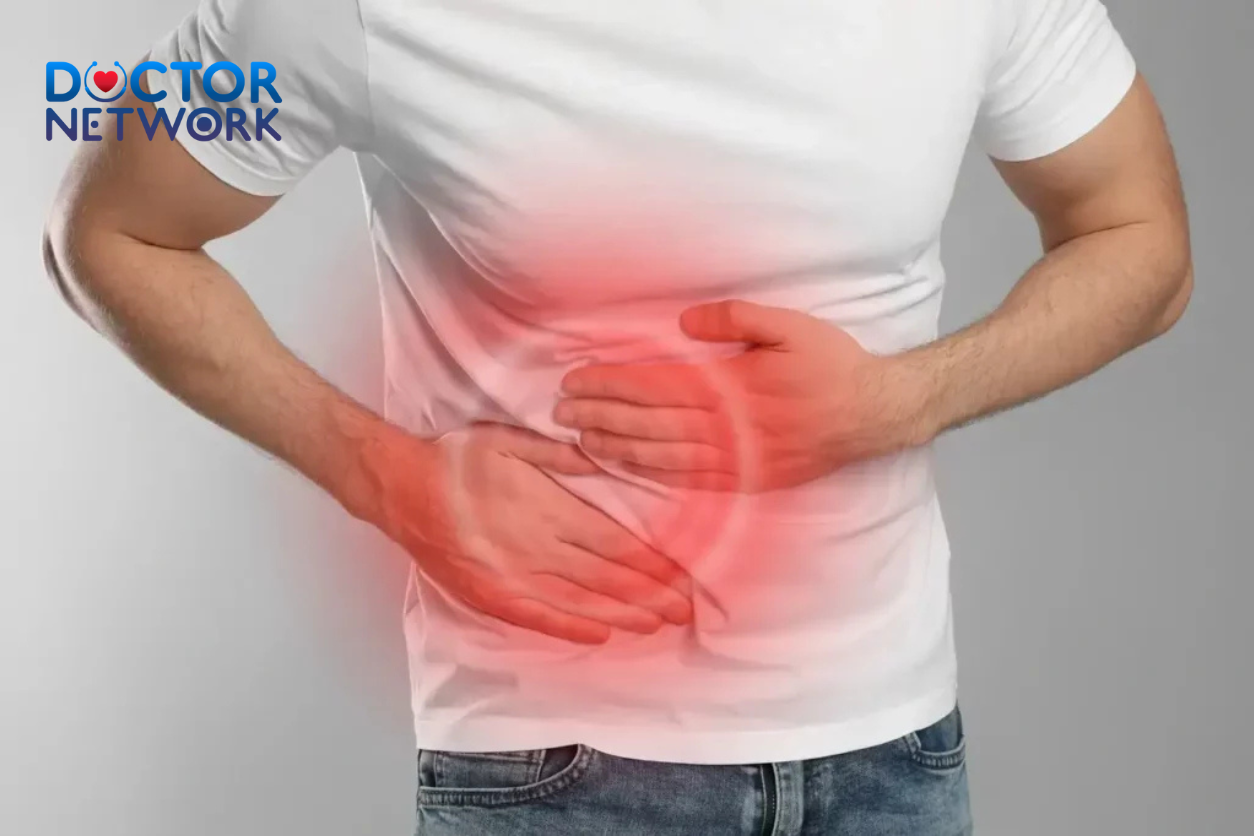Gastroesophageal reflux disease (GERD) is a common condition that often raises concerns about its potential danger. So, does GERD merely cause discomfort, or can it lead to serious health issues? Let’s delve into the details of “is GERD dangerous” in the following article.
Gastroesophageal Reflux Disease (GERD) – When Stomach Acid Backs Up
GERD occurs when stomach acid frequently backs up into the esophagus, the tube connecting the mouth to the stomach. This condition causes uncomfortable symptoms and can even damage the esophageal lining if not properly managed.

GERD occurs when stomach acid frequently backs up into the esophagus, the tube connecting the mouth to the stomach
How Dangerous is GERD?
Is GERD dangerous? Common complications of GERD include:
- Esophagitis – is GERD dangerous: Stomach acid contacting the esophagus causes inflammation, swelling, acting as a “gateway” to more dangerous complications.
- Esophageal Ulcers: Prolonged inflammation may lead to ulcers, or even bleeding.
- Esophageal Stricture: Long-term inflammation leads to scarring, fibrosis, causing narrowing of the esophagus, leading to difficulty swallowing.
- Impact on Quality of Life – is GERD dangerous: Difficulty breathing, chronic cough, insomnia, etc., significantly reduce the quality of life due to GERD.
Most Serious Complication: Esophageal Cancer
According to the American Cancer Society, long-standing GERD increases the risk of adenocarcinoma of the esophagus – a dangerous form of esophageal cancer. Therefore, actively treating GERD is crucial to prevent this life-threatening complication.
Warning Signs of Dangerous GERD – is GERD dangerous
In addition to typical symptoms like heartburn, acid regurgitation, the following signs indicate potentially dangerous GERD and should prompt specialized evaluation:
- Chest pain, easily confused with a heart attack.
- Difficulty swallowing, feeling of food sticking, choking.
- Nausea, frequent vomiting.
- Chronic cough, hoarseness.

Chronic cough, hoarseness is one of the warning signs of dangerous GERD
Treatment of GERD – Preventing Complications
Currently, GERD is managed through:
Lifestyle Modifications:
- Elevating the head of the bed while sleeping.
- Eating smaller meals, avoiding overeating.
- Limiting fatty foods, spicy foods, alcohol, and caffeine.
- Losing weight if overweight or obese.
- Avoiding lying down immediately after eating.
Medications: Acid-reducing drugs, antacids, etc., (to be used as directed by a physician).
Surgery: Rarely needed, when conservative measures fail to achieve adequate control.
Effective Prevention of GERD
Positive lifestyle changes help prevent and effectively manage GERD:
- Healthy eating habits, balanced nutrition.
- Regular physical exercise, maintaining a healthy weight.

Regular physical exercise, maintaining a healthy weight
- Avoiding tobacco, limiting alcohol consumption.
- Stress management, getting enough sleep.
Frequently Asked Questions about “is GERD dangerous”
Here are 5 commonly asked questions related to the topic “is GERD dangerous“:
- How long does GERD last?
Simple GERD can often improve quickly (within a few days, weeks) with dietary and lifestyle adjustments. However, GERD, as a chronic condition, requires long-term treatment and adherence to physician guidance to prevent complications.
- What to eat and avoid with GERD?
Eat: Green vegetables, low-acid fruits, lean meats, fish, whole grains, yogurt, etc. Avoid: Fried or fatty foods, spicy foods, stimulants, alcohol, coffee, etc.
- Is GERD caused by stress?
While stress itself doesn’t directly cause GERD, it can exacerbate symptoms. Effectively managing stress is part of preventing and supporting GERD treatment.
- Is GERD contagious?
GERD, specifically GERD, is not an infectious disease and therefore cannot be transmitted from person to person.
- Does GERD cause cancer?
Chronic GERD, if untreated, increases the risk of adenocarcinoma of the esophagus. Therefore, proactive GERD treatment and regular health monitoring are crucial for protecting against this dangerous complication.
Scientific Evidence Related to “is GERD dangerous”
Here are some scientific references related to “is GERD dangerous“:
- A study from Harvard Medical School showed that 10% of GERD patients are at risk of esophageal ulcers.
- A long-term study involving 43,520 individuals found a more than 2.5-fold increased risk of death from esophageal cancer in GERD patients.
- A study revealed that 75% of GERD patients experience symptoms that significantly affect daily life.
Is GERD dangerous? In conclusion, GERD can indeed be dangerous, especially when left untreated, potentially leading to severe complications, including esophageal cancer. Therefore, when noticing any unusual symptoms, proactive consultation with a gastroenterologist is essential for timely diagnosis and treatment.
References:
https://my.clevelandclinic.org/health/diseases/17019-acid-reflux-gerd
https://www.mayoclinic.org/diseases-conditions/gerd/symptoms-causes/syc-20361940
Kiểm Duyệt Nội Dung
More than 10 years of marketing communications experience in the medical and health field.
Successfully deployed marketing communication activities, content development and social networking channels for hospital partners, clinics, doctors and medical professionals across the country.
More than 6 years of experience in organizing and producing leading prestigious medical programs in Vietnam, in collaboration with Ho Chi Minh City Television (HTV). Typical programs include Nhật Ký Blouse Trắng, Bác Sĩ Nói Gì, Alo Bác Sĩ Nghe, Nhật Ký Hạnh Phúc, Vui Khỏe Cùng Con, Bác Sỹ Mẹ, v.v.
Comprehensive cooperation with hundreds of hospitals and clinics, thousands of doctors and medical experts to join hands in building a medical content and service platform on the Doctor Network application.


























